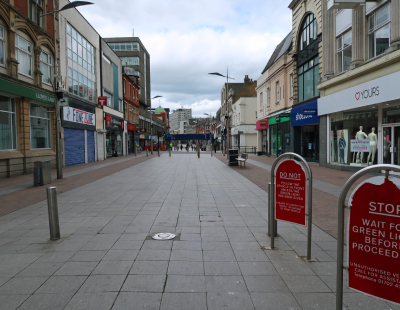He says one notable trend has been people moving out of cities as they realise that they don’t need to be living within striking distance of the office full-time any longer. According to figures from the Economic Statistics Centre of Excellence, some 700,000 people left London in the last six months of 2020.
“Whether this is a temporary or permanent trend remains to be seen, but either way as long-stay rentals become more available in cities, property investors are having to be more flexible in the way that they rent out these assets,” Liverton said. “They are pivoting and turning them into flex assets - renting them out as short-lets and responding to the demand from remote workers for flexible accommodation.”
He added: “Just as PropTech adoption has accelerated as a result of the pandemic, so this trend of remote working and flexible living has accelerated. If property investors are nimble, they can get in on the short-term rental demand and make their assets work profitably during this period.”
While the Governor of the Bank of England suggests that we will never go back to working in the way we did before Covid, a ‘hybrid’ model is more likely, whereby workers can drop into an office (perhaps a creative hub) for a week at a time or combine home and office locations in parallel.
“If this is the case, the demand for short-term rentals will remain as we drop in and out of locations depending on ever-changing work/life schedules and needs,” Liverton concluded.
Changing ways of working
The idea of a new hybrid model and very different ways of working than pre-pandemic is backed up by the latest data.
New findings from Quotezone.co.uk have revealed that the work from home boom, which has seen millions working remotely over the past year, has changed the commercial landscape of work and city life dramatically.
Its data suggests that working from home is here to stay as demand for commercial office spaces drops by half. The stats, based on a sample of over 11,000 commercial property insurance policies, highlighted a 49% fall in insurance quotes for office space in the UK, compared with the same data in 2019.
As the number of vaccinations increase and infection rates continue to go down, the UK is starting to see a way out of the pandemic. However, while many aspects of lockdown life are likely to return to near-normal as soon as restrictions are lifted, there seems likely to be resistance to returning to the office full-time as many workers have experienced the benefits of working from home.
Recent data from Statista found that 73% of office workers believe that they are more productive when working from home, an unsurprising figure considering the average UK commute was 58 minutes before the pandemic and many workers will be losing more than two hours a day when office spaces do reopen.
While the demand for office space is down, Quotezone’s data did show an increased demand for commercial property insurance for a number of businesses, showing early signs of what the commercial landscape could look like in the UK post-pandemic.
The most resilient properties were high street takeaways, including fish and chip shops, Indian takeaways and Chinese takeaways, with the number of insurance quotes for this type of commercial property increasing by 4% in 2020. Takeaways have still been able to operate through much of the pandemic and have boomed as people have sought a weekday or weekend lockdown treat.
In a similar way, the data showed that insurance quotes for B&Bs, guest houses and hostels also grew by 3%. As the UK settles into its second summer of ‘staycations’, Quotezone says it seems highly likely that spending the holidays closer to home will become a new British staple.
“The data offers a glimpse into the post-pandemic commercial landscape, and it will almost certainly be different to life before 2020,” Greg Wilson, founder and chief executive of Quotezone.co.uk, said.
“For one, the data shows a big shift around office culture and continued home working could be a large step towards achieving a more balanced work life in the UK. It is also positive to see some industries growing even in the midst of multiple lockdowns.”
Government must help high streets build back better
Leading land agents Aston Mead believe it is down to the government to go further to assist the transition of high streets into a new era post-Covid.
The company argues that, whilst grants, a VAT freeze and an extension to business rates relief have all helped during the pandemic, more needs to be done to ensure that high streets can recover from the hits they have taken during the pandemic and find a sustainable future.
“The high street was already struggling before coronavirus. But in the past year, the impact from e-commerce has been immense,” Adam Hesse, director of Aston Mead Land & Planning, said.
“Only last week it was announced that online sales in February made up the highest proportion of UK sales on record. Coupled with business rates which are still too high - and a review now pushed back until later in the year – if we don’t act soon, there will be a bloodbath of businesses out there.”
Hesse, though, thinks all is not lost and claims that some simple measures could help to ensure that high streets are transformed in a way that would continue to make them places people will want to visit, in order to eat, drink, socialise and shop.
“The UK high street is a key part of what gives our towns and cities character. But they are not going to be saved if we stand still,” he said. “Part of the problem is that currently, if a retail building is vacant, the landlord still has to pay rates. This is not helpful in the post-Covid era. So new rules could state that if shops were made available free of rent to short-term pop-up tenants, no empty rates would be payable – a massive bugbear for landlords!”
He added: “Plus smaller retailers would get a cheap taste of the high street – a win-win situation. This would also help prevent having rows of run-down premises and create a sense of vibrancy, which in turn would attract more people into the centre.”
Another problem, he said, is that our town and city centres have grown too large. “In some cases, it can seem like high streets run on and on, with secondary retail at either end not bringing the vibrancy required to attract enough customers,” he explained.
“At a time when we are already seeing an exodus to the countryside and traditional commercial stock evaporating to make way for new homes, this situation is unsustainable. Therefore, I propose that planners agree a ‘Shopping Zone Redline’ around a retail area, to ensure that it is never lost.”
He went on: “Then there could be an immediate ‘Outer Zone’ which is looked upon favourably for the private rental sector so that more people live, work and play in the centres 24/7. And we mustn’t forget that by 2030, one in five people in the UK will be aged 65 or over – so retirement homes and care homes should be part of that mix.”
“That way, those residents would be within walking distance of all the local attractions, facilities and healthcare services. In fact, the demand for over-60s apartments in town centres is only going to escalate - and this would be a great way of repurposing the secondary retail in each town that is no longer viable.”
He concluded: “Building back better means finding space for much-needed housing. But it also means finding a new role for the UK high street, so that it manages to thrive in the years ahead.”


















Join the conversation
Be the first to comment (please use the comment box below)
Please login to comment